-
SHAUMAK SEN: ALL THAT BREATHES (2022)
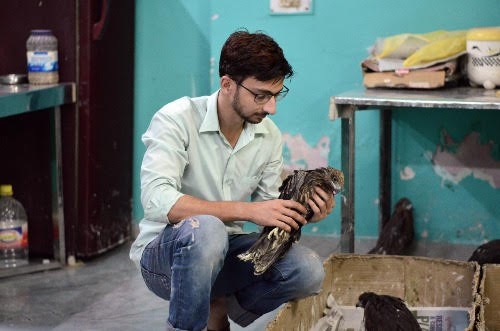
SALIK REHMAN IN ALL THAT BREATHES Credit: CitySpidey
"One shouldn't differentiate between all that breathes"
This is a remarkable documentary that, while appearing unpretentious and ordinary and really quite drab on the surface, unfolds entirely in its own way, with its own look, feel, edits, and rhythms and tinkly orchestral score. One doesn't even like to call it a "documentary." It's a film. It draws us into its world and in doing so it takes its time. Often a great documentary creeps up on you and must be a slow gathering of details, a gradual astonishment. So it is with All That Breathes. I had a sense that this would be special since missing it in the Main Slate of the New York Film Festival, and it turned out even better than expected.
All That Breathes is a film about three men in perhaps one of the worst parts of the city of Delhi. Brothers Mohammad Saud and Nadeem Shehzad, and Salik Rehman, their cousin who works with them are all of Muslim origin. Things are becoming discriminatory under the Hindu nationalist and increasingly dictatorial Narendra Modi and if they're outlawed, they muse, they haven't the credentials that would get them into Pakistan. Their life project is saving black kites. These birds replace vultures in consuming waste. Mountains of garbage would grow without them. More of them are falling from the sky: the air of Delhi is the most polluted in the world, for the birds, as for humans, increasingly unsustainable but it may be their numerousness and proximity to the millions of the city that is their undoing.
The brothers and sometimes grumpy with each other and break out in verbal battles. But they say it's not them. It's what's happening in the sky that causes these little fracases. Mostly they work peacefully together. They have done so since they were "teenage bodybuilders" and discovered the kites and their need for first aid, and they applied information on muscles and tendons they'd gathered that way to the muscles and tendons of the birds. As boys they'd been taken to throw meat to the kites by their father, and knew it was deemed good luck. As youths they'd rescued small animals but they gradually focused on kites because regular bird hospitals rejected them for being neat eaters. Now their bird hospital in incorporated as a charity called "Wildlife Rescue."
They also assemble soap dispensers for income, and the older brother, toward the end, goes to the States to study for a while, leaving brother and cousin to hold the fort till he returns. We have glimpsed and heard of violence and houses set afire quite nearby as well as demonstrations against violence. The brothers work on. Their urgent effort to save the kites is a still point of reason and wholeness in what we may dimly perceive as an apocalyptic and crumbling capitol city. A motif of the artfully askew All That Breathes is the oneness of men, and the unity of man and nature, which here seem both impossible, and inevitable. Beside a torn up street, a terrapin crawls. Along a flooded street, cattle walk. We even glimpse a wild pig. Nature is alive and well after all in this overpopulated city.
An unseen eye and an unseen voice and a camera that likes to slide slowly across a scene provide us with views of the brothers and their work surroundings. The first thing one may notice is hands holding one of the big birds and the firm, gentle, practiced touch. Placing the bird somewhere, carefully. Plying apart the feathers to examine a wound, a weak limb, a spot of blood.
Their digs are shabby but somehow cozy. The younger, thinner cousin, Salik Rehman, is on a balcony when a kite comes by and grabs his glasses. It flies off with them. It does not come back. He talks about those lost glasses for a while, rather to his cousin's annoyance. Another time two of the guys strip and swim out into the river to rescue a wounded kite that will be eaten shortly if they doh't save it. Nadeem Shehzad directs them. Surprisingly, the seemingly more fit Salik runs out of energy and panics, caught in the middle of the water. But they make it back.
As suggested, these activities in themselves may seem inconsequential, but it's the focus they show, and the patient rhythm. It turns out the black kites of Delhi are often injured by glass-coated strings used for the other, human, sort of kites, those flown in the air by people. The birds of prey have grown more numerous due to large slaughterhouses in the city. (I get this and much more from a copiously illustrated local article in CitySpidey. They are falling out of the sky in greater and greater numbers, but also this bird hospital is known to more and more people. Selek Rehman is bringing more and more of the cardboard boxes used to hold the sick or injured birds every day. A NYTimes article helps get more funding and a lovely white "open cage" up on the roof has been created.
The work at Wildlife Rescue strives for non-invasiveness, for preservation. The style of this film likewise is to help things along without ever seeming to intrude. It's an unusual combination, and the gentle tuning in to the naturalist's view is unusual too. All That Breathes lives up to that cliché: it takes you somewhere you've never been before. I wouldn't want to tell you too much about it, but there's no danger: no review can capture the unique style and mood of this lovely and thought-provoking film.
All That Breathes debuted at Sundance Jan. 2022 winning the grand jury documentary prize, and it went to Cannes, winning the the Golden Eye award. Numerous festivals, awards, and nominations followed. It will be released on HBO later in Jan. Metacritic rating: 86%.
Last edited by Chris Knipp; 01-24-2023 at 02:48 PM.
-
SHOWING UP (Kelly Reichardt 2022)
KELLY REICHARDT: SHOWING UP (2022)
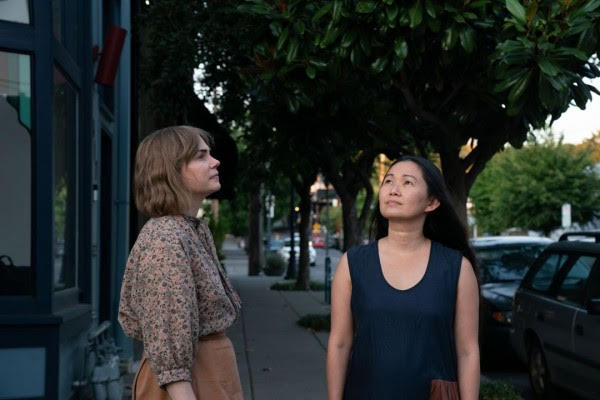
MICHELLE WILLIAMS, HONG CHAU IN SHOWING UP
An artist prepares for her show
I previously wrote about Kelly Reichardt's Certain Women (2016-NYFF): "If Reichardt achieves authenticity and a sense of real time in these sad, dreary tales, there's also a lack of economy and a lack of verve, almost a stubborn clumsiness. And so this time it's tempting to side somewhat with Rex Reed in the Observer, who commends the acting in this film but condemns Reichardt's style. "Nothing ever happens in her movies," Reed says, "but a handful of critics rave, they end up on the overstuffed programs at film festivals like Sundance and are never seen or heard from again." That isn't really true. But this is a failed movie with one powerful thread, and I wish Reichardt's 2014 Night Moves had gotten all the attention that her 2010 Meek's Cutoff did."
This is the way it has gone for me, perhaps for others. Reichardt is a significant American auteur. Ever since what technically may have been her third film (2006), Old Joy (though nobody saw the first two), critics and cinephiles have had a lot of time for Reichardt's films, even when they were very often stubborn and resisted attention. There are only half a dozen, but have appeared regularly, mostly at three-year intervals; this new one shows no delay from the pandemic. All have stayed in the mind, nagged like Meek's Cutoff, excited like Night Moves, even touched like First Cow. The new one nags, bores, and annoys, but it won't go away. And though one strains to see why Reichardt wanted to make it, its realness leaves one impressed. It's a vivid slice of life. Was it worth slicing? Maybe here there is a lot about today's minor, struggling artist that is so specific it could wind up being enlightening.
Though sharing qualities of being stubborn, specific, and resisting conventional rewards, Reichardt's films have gone in different directions. She has shown a gift for carefully researched and offbeat dips back into early nineteenth-century America with the 1845-set western-traveling Meeks Cutoff and the 1820 pre-Oregon First Cow - the first hard to take, the second hard to resist. This time she doesn't go far: Oregon and art. (She has taught film for some years at Bard, in Annandale-On-Hudson, New York, a school with a strong art focus. Most of her films have been shot in Oregon.) The protagonist of Showing Up is a grumpy, dumpy single woman artist, Lizzy (Michelle Williams in her fourth Reichardt joint) preparing for a show of her small baked figurative sculptures while dealing with "the daily dramas of family and friends."
Léa Seydoux also drabbed-down for her lead in Mia Hansen-Løve's recent One Fine Morning. But with Léa, the radient beauty shines through. Michelle's doesn't: she loses herself in unappealing, unfriendly Lizzy. She doesn't seem to look at us, or anybody. She looks at, and touches, almost caresses those odd sculptures of hers (actually made by the Portland-based artist Cynthia Lahti). They are about two feet tall, or less, of women contorted or gesturing extravagantly. An extreme, expressionistic outgrowth of the school of Rodin, they seem unfashionable, out of date (who makes figurative sculptures anymore?). Isn't this part of the point? Though she doesn't quite say it, Lizzy probably doesn't expect her sculptures to be appreciated.
Lizzy grouses most of all with Jo (Oscar-nominated Hong Chau), her neighbor and negligent landlady, since the latter is s taking weeks to repair Lizzy's water heater. But Jo's an artist too - her work is big and colorful; we glimpse it - and has two shows coming up. Both are connected with a local Portland art school; Jo teaches, Lizzy works in an office, her mother the director. Jo points out her rent is low. She hasn't got it too hard. Her sculptures get baked in a kiln at the school by a friendly, cheerful guy, Eric (André Benjamin). Her father (the resurgent Judd Hirsch again), himself a potter, now, he insists, retired (his work looks handsome), is sprightly and cheerful.
Who arguably doesn't have things so good is Sean (John Magaro, who played the lead role of Cookie in First Cow), Lizzy's brother, who's an artist too. Lizzy may think her parents considered him more talented than she, but he has fairly serious mental issues; his behavior is unpredictable, and he's certainly not happy.
All this is what Showing Up is "about" - along with the obvious MacGuffin of a wounded pigeon Lizzy's cat brings in that she and Jo wind up trading places in caring for. The beauty of the film is how spot-on all the details are. But while Kelly Reichardt films have been fights for survival, the urgency level here is like, whether there is too much cheese on the table at Lizzy's show reception, and then, whether her crazy brother will eat it all up.
Showing Up, 107 mins., debuted in Competition at Cannes May 27, 2022, also in the Main Slate of the NYFF Oct. 5 and shown in a dozen other international festivals. US theatrical release by A24 April. 7, 2023. Metacritic rating 84%. Surprisingly, Mick LaSalle of the San Francisco Chronicle gave it a rave. He always seemed to hate everything and have very conventional tastes. Screened for this review at Landmark Albany Twin April 28, 2023.
-
NO BEARS (Jafar Pqnahi 2022)
JAFAR PANAHI: NO BEARS (2022)
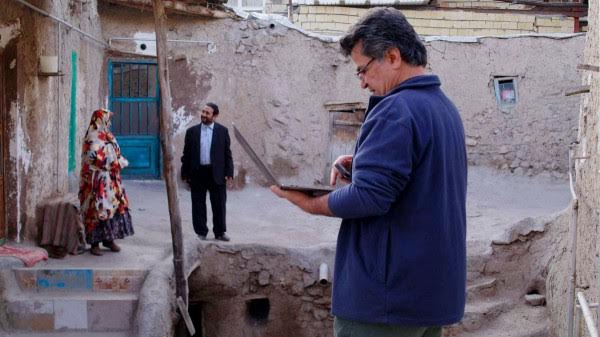
JAFAR PANAHI (RIGHT) IN NO BEARS
The oppressed Iranian filmmaker's fifth clandestine film is a dry multi-layered puzzler
I wonder how Pauline Kael would have reviewed the films of Jafar Panahi, Iran's most famous filmmaker. She did have the balls to pan a sacred cow of a film like the exhausting Holocaust documentary Shoah. Panahi too is a sacred cow. He, or the character with his name in his latest film, No Bears, the fifth made clandestinely since he was forbidden by the government to make films, is a muted, ironic figure, the tight-lipped protagonist, the understated star of his own work. Jafar Panahi is a real life hero. Despite imprisonment, house arrest, and being banned in 2010 from making films for 20 years, he has managed to go on making them, and refuses to leave the country. But when he is showered with praise, how much can we separate the filmmaking from his well-deserved glow as a hero of artistic resistance to the oppressive regime of the mullahs?
Maybe Jafar Panahi's films could be more entertaining. It might seem impossible to make a fun movie about an oppressive country like Iran, but this was disproved last year when Panahi's own son, Panah Panahi, released his first feature, the hilarious, stimulating, meaningful and sad Hit the Road. His father Jafar's new one is many-layered and complex in ways that reviewers are delighted to parse. It offers rewards for seasoned fans. But its entertainment is of a very dry and subtle sort, if entertainment there is.
Nonetheless No Bears, which shows Jafar Panahi, or "Jafar Panahi," struggling to direct a film remotely from an Iranian village near the Turkish border, where the cast and crew are, is an impressively smart and understated film. Its blending of fiction and documentary elements is a feature of the director's style that goes back to his first work. For example, a clip he shows in This Is Not a Film records a girl being filmed on a bus who tears off a fake leg cast yelling that she refuses to participate in this charade. This is essentially what a couple does in No Bears: they are playing a version of themselves (or their film selves), a dissident couple, Zara (Mina Kavani) and Bakhtiar (Bakhtiar Penjei), who have escaped the country, but the wife protests that the in-film version they're being asked to enact is a whitewashed image of her far worse sufferings in ten years of struggle and she won't go on with it. Is this outburst true to life, or is it the fiction? We don't know.
This film has been described as revolving around "two parallel love stories." The first involves the troubled mature couple in the film-within-the-film who are, or were, seeking to escape the country. The other is a young couple in the village "Panahi" is staying in, Gozbal (Darya Alei) and Soldooz (Amir Davari). Accused of holding back a photo on a digital disc depicting a couple said to be in love, while the girl is being set up for arranged marriage to another, the No Bears "Panahi" denies that he made any such photo. He is asked by the village chief (Naser Hashemi) to go to a place called "the oath room" where he will swear to this, but he is assured parenthetically that this place is just a village tradition, and it is "okay to lie." That kind of says it all: this is a country where oaths and morality are a big deal, but lying is a common, assumed practice.
The interest, the dry fun, of No Bears is its confusing mix of urban and rural and of documentary and fiction. It is all fiction: the "real" "Jafar Panahi" seen here is a bit less like the "real" Jafar Panahi than in his previous four clandestine films. He is not making this film about the couple seeking to escape the country, but a film about making such a film. In the meantime there is much static from the "actual" location, where "Panahi" is, a small village (not actually where it's said to be). "Panahi" is renting a large room in the village, but his "host" is constantly looking for excuses to make him leave. There is trouble in the village, the fracas over the contested wedding, and "Panahi" is in the middle of it because of allegedly having photographed the would-be "bride" with her real "lover." A little boy claims when "Panahi" was taking his picture with several other boys, he saw "Panahi" photograph the couple. There is also more commonplace buffoonery of a sort Panahi seems to like now, when "Panahi" must climb a ladder trying to connect with wi-fi (the reviewer for Slant has said this is a ripoff from Kiarostami). All the sophistication of good digital cameras, slim laptops and smartphone, clashes with the rustic walls, obligatory glasses of tea, and the feeble wi-fi of a village.
This contrast between the primitive and the modern is in your face here. The village is rife with "traditions" and rigid conventions about marriage. The old ladies serving "Panahi" provide excellent cooking, but with the shaky internet, the rental "host" a constant annoyance and the challenged would-be groom in a constant menacing rage, disorder is just round the corner. The latter individual delivers a prolonged rant in the "oath room" scene that illustrates something Iranians in films often seem to excel at: orally haranguing and abusing each other.
But the urban, and urbane, "Panahi" never loses his cool. His dry restraint stands as a reproach to all the misbehavior and his own mistreatment. He stands aloof; and beyond that lurks the courage of the real filmmaker who has endured so much harassment from the Iranian government and remained productive through it all - though post-No Bears, he was in prison again, initially along with the other top Iranian filmmaker, Mohammad Rasoulof (the third is Asghar Farhadi). (In early Feb. 2023 he was released from prison.)
Panahi's first clandestine film, the 2011 This Is Not a Film, was smuggled out of the country on a flash drive in a loaf of bread and shown at Cannes, the New York Film Festival (where I reviewed it), and in forty other festivals, winding up on many best movie or best documentary lists. The subsequent three and this one have likewise received top honors from critics and festivals. Mohammad Rasoulof was recently on the Venice jury. This in part is a triumph of digital technology and the internet, also celebrated indirectly in No Bears, with "Jafar Panahi" directing a film from across the Turkish-Iranian border, which dramatically he refuses to cross.
The title No Bears, is symbolic of a rejection of naïve village traditions embracing ignorance. The village chief talks about the danger of bears to "Panahi," but then says the menace of the ursine critters is only a superstition: there are "no bears." Martin Luther King famously declared that "the arc of the moral universe is long, but it bends toward justice." Hopefully it bends toward rationality and artistic freedom too, even in Iran. But there is more gloom than hope in No Bears. Jessica Kiang wrote in her Variety review that where his earlier clandestine films celebrated "the liberating power of cinema," this is a darker one where Panahi "slams on the brakes." In his Slant review Sam C. Mac, noting the devotion to "meta" in Panahi shows his debt to his mentor Abbas Kiarostami, points to what is also my main objection in No Bears: that it's overburdened by an "increasingly convoluted plot" developed to illustrate its themes, and is not, despite what some critics have said, as visually interesting as his other recent films. But it is part of an œuvre that we cannot overlook.
No Bears 106 mins., in Farsi (Farsi title خرس نیست/Khers Nist), debuted at Venice Sept. 9, 2022 and was shown in about 50 other international festivals, including Toronto and New York. Its official US theatrical release was Dec. 23, 2022 in New York City (Film Forum). It premiered on the Criterion Channel Apr. 18, 2023, where it was screened for this review.
-
Metascores of the 2022 nyff main slate
Metacritic ratings of NYFF 2022 Films and links to reviews
Opening Night
“White Noise”
Dir. Noah Baumbach
Metacritic: 66%
Centerpiece
“All the Beauty and the Bloodshed”
Dir. Laura Poitras
Metacritic: 90%
Closing Night
“The Inspection”
Dir. Elegance Bratton
Metacritic: 73%
NYFF 60th Anniversary Celebration
“Armageddon Time”
Dir. James Gray
Metacritic: 74%
“Aftersun”
Dir. Charlotte Wells
Metacritic: 95%
“Alcarràs”
Dir. Carla Simón
Metacritic: 85%
“All That Breathes”
Dir. Shaunak Sen
Metacritic: 87%
“Corsage”
Dir. Marie Kreutzer
Metacritic: 76%
“A Couple”
Dir. Frederick Wiseman
Metacritic: 74%
“De Humani Corporis Fabrica”
Dir. Véréna Paravel and Lucien Castaing-Taylor
Metacritic: 90%
“Decision to Leave”
Dir. Park Chan-wook
Metacritic: 84%
“Descendant”
Dir. Margaret Brown
Metacritic: 87%
“Enys Men”
Dir. Mark Jenkin
Metacritic: 77%
“EO”
Dir. Jerzy Skolimowski
Metacritic: 85%
“The Eternal Daughter”
Dir. Joanna Hogg
Metacritic: 80%
“Master Gardener”
Dir. Paul Schrader
Metacritic: 59
“No Bears”
Dir. Jafar Panahi
Metacritic: 92%
“The Novelist’s Film”
Dir. Hong Sangsoo
Metacritic: 82%
“One Fine Morning”
Dir. Mia Hansen-Løve
Metacritic: 85%
“Pacifiction”
Dir. Albert Serra
Metacritic: 79%
“R.M.N.”
Dir. Cristian Mungiu
Metacritic: 75%
“Return to Seoul”
Dir. Davy Chou
Metacritic: 88%
“Saint Omer”
Dir. Alice Diop
Metacritic: 91%
“Scarlet”
Dir. Pietro Marcello
Metacritic: 69%
“Showing Up”
Dir. Kelly Reichardt
Metacritic: 81%
“Stars at Noon”
Dir. Claire Denis
Metacritic: 64%
“Stonewalling”
Dir. Huang Ji and Ryuji Otsuka
Metacritic: 84%
“TÁR”
Dir. Todd Field
Metacritic: 92%
“Trenque Lauquen”
Dir. Laura Citarella
Metacritic: tbd
“Triangle of Sadness”
Dir. Ruben Östlund
Metacritic: 63%
“Unrest”
Dir. Cyril Schäublin
Metacritic: tbd
“Walk Up”
Dir. Hong Sangsoo
Metacritic: 86%
Last edited by Chris Knipp; 12-27-2023 at 06:22 PM.
-
PACIFICTION (Albert Serra 2022)
ALBERT SERRA: PACIFICTION (2022)
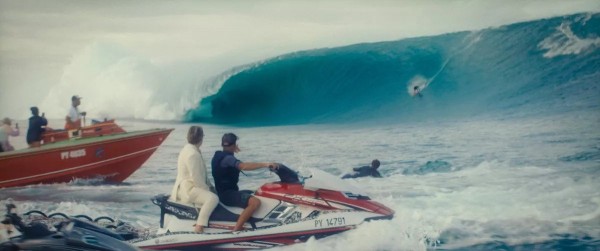
MAGIMEL CHAUFFEURED ON JET SKI IN PACIICTION
Benoît Magimel triumphs winging it as a slimy French colonial bigwig
Benoît Magimel played the corrupt, manipulative son of gangsterish political boss Gérard Depardieu in the intricately plotted 2016-1018 French TV series "Marseille." Now he is Catalan auteur Albert Serra's Tahiti would be high roller High Commissioner De Roller in the drolly named Pacifiction, a slow-burning drama with almost no conventional plotline at all, that pacifies us and intrigues us instead with its deeply unnerving, vaguely surreal mood-picture of colonial wickedness, what Bradshaw called "its stealthy evocation of pure evil." It's beautiful, and Magimel's improvisations that ooze with slimy charm and weave double-breasted linen façades of invisibility and fake good will never disappoint. If the film works for you, and it worked for me and for many others, you will be on the edge of your seat at well over two hours scrutinizing the beautiful dark images of the Tahitian night in search of a climax that never quite comes but whose premonitions will haunt you with their teasing lack of resolution.
Serra's previous films have involved historical figures "hanging out," Don Quixote and Sancho Panza, then Casanova meeting Dracula (2013), or just slowly dying in the case of Louis XIV embodied by Jean-Pierre Léaud (2016). His last film (2020), which I haven't seen, and was less well received, consists of "bucholic debauchery" of pre-revolutionary French aristocrats. Pacifiction, the most complex and satisfying of Serra's films that I've seen, is set in the present and refers hauntingly to the nineties when France - not exactly on Tahiti, but on many outlying islands - From 1966 to 1974 blew up 41 nuclear weapons in above-ground tests in French Polynesia, grossly underestimating the fallout and human toll of cancer and deformed offspring for generations to come. Now there is a rumor going around that a return to nuclear testing on the islands is being planned.
In Pacifiction High Commissioner De Roller appears in many settings. Mostly he charms or wings it as a collaborator. Notably he must also encounter Matahi (Matahi Pambrun), a young local firebrand who warns him about coming demonstrations against nuclear testing. It's not a friendly meeting, but even this time De Roller comes up close and talks in a low voice, making it feel like he and Matahi are collaborators. Elsewhere he denies that any such thing is afoot; assures that he will do everything he can to make sure it doesn't happen; or he says he is an underling and knows nothing; or, to cohorts, in confidence, says he doesn't care; toward film's end with his silent Sancho Panza, Lois (Lluís Serrat, who played that role for Serra in 2006), he declares that it's going to be more than testing, it's going to destroy everything, and they're going to be long gone and don't give a damn.
A trouble is that as evidenced by Lois, except for an elegant, tall, trans person called Shannah (Pahoa Mahagafanau) who wants to become De Roller's assistant and does so, and that quickly passed over moment of challenge from Matahi Pambrun, there's rarely anybody on the highly colored 4K screen sipping fruity drinks or riding chauffeured jet skis as interesting as Magimel. But Magimel as De Roller is a cipher too, just a fascinating one.
Perhaps it's how undefined the figures are that makes them haunting, part of the mystery this film weaves. There's a Portuguese, Ferreira (Alexandre Melo), turned up hung over and without a passport. Is he an enemy or a victim? There's the often-referred to "Admiral" (Marc Susini), seen drunkenly dancing at the sleazy nightclub De Roller drops in on, whose proprietor Morton appears in a cameo by Sergi Lopez. There's Mike (Mike Landscape), an American, seen with Fereira, clearly not friendly towards De Roller. These and others are never defined and remain troubling ciphers.
As Guy Lodge writes in his Variety review, with De Roller, "whether he’s appeasing local community leaders to pave the way for a new luxury casino development, paying tribute to a visiting French novelist attempting a Gauguin-style creative exile, or simply making small talk with fellow patrons at the sleazy neighborhood nightclub...every encounter is a negotiation and a performance." It's the endless slow unrolling of these that makes Pacifiction, as Lodge says, as do many, "Curiously hypnotic."
Widening the description, A.O. Scott of the New York Times called the film "John le Carré by way of David Lynch" and "a feverish and haunting but also wry and meditative rumination on power, secrecy and the color of clouds over water at sunset." Yes, it also ruminates on the, for us city dwellers, almost unhealthy lushness of tropical greenery, tropical rain, intensely tinted tropical skies. Their beauty is cloying, and Serra seeks out carefully here, with premeditation, the enhanced creepiness of vast moral evil when observed in a setting of postcard-perfect loveliness.
The slowness is part of Serra's working process. His declared method is to shoot fast and play out slow. Many hours of film were shot in only four days. The shooting was supervised by dp Artur Tort in 16mm. with three 4K Black Magic Pocket Cameras with zoom lenses with cameramen working autonymously. The successive scenes are all autonymous too, not fully defined as relating to each other. They are spliced together, the way the surrealists made their "Exquisite Corpse" foldups of separate drawings whose connection the artists didn't know. Binding Pacifiction's image-world is what Lee Marshall of Screen Daily calls "a rich soundscape that pushes the oneiric envelope and takes certain scenes into paranoid-thriller genre territory." There is a restrained, satisfyingly spooky score by Marc Verdaguer and Joe Robinson that becomes particularly effective with the empty, haunting final images.
The methods are willfully unconventional: at least Serra means them to be. And how it all fits together depends as much on our imaginations as this artistry. This is the beauty of Beenoît Magimel as an actor. Kept ignorant of script, with storyline an outmoded concept, Magimmel contributes the unifying source of a series of Rorschach blots that almost mean something. We put them together in our minds helped by the conviction Magimel brings. Kurt Brokaw in The Independent admiringly described this "slowest slow-burner in many a season" as "a picture that coils around you and then starts squeezing in," working "on the disturbing premise that what happened in a distant past was a prelude to what’s going to happen again." The result, in another rave, this time from Christian Blauvelt of IndieWire, is that this is "the art film of the year," but perhaps also Serra's most accessible.
Pacifiction/Pacifiction-Tourment sur les îles, 162 mins., debuted in Competition at Cannes May 26, 2022. It was also shown at Munich, Jerusalem, Melbourne, Beijing and dozens of other international festivals, including Toronto, New York (in the Main Slate), Vienna, Tokyo and Taipei. The film has won great admiration among French critic s; not so much with the French audience. Its AlloCiné press rating is 4.0 (80%); audience rating 2.7 (56%). Magimel won the César for Best Actor, becoming the first male actor ever to do so a second year in a row, 2022's being for Émanuelle Bercot's Peaceful/De son vivant. Metacritic rating: 75%. Pacifiction received limited US theatrical release February 17, 2023. It now is on Mubi and Amazon Prime video.
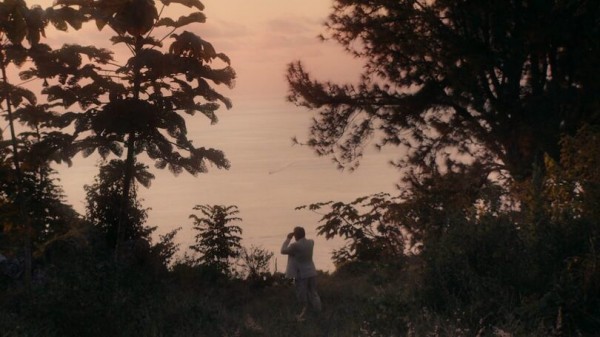
STILL FROMPACIICTION
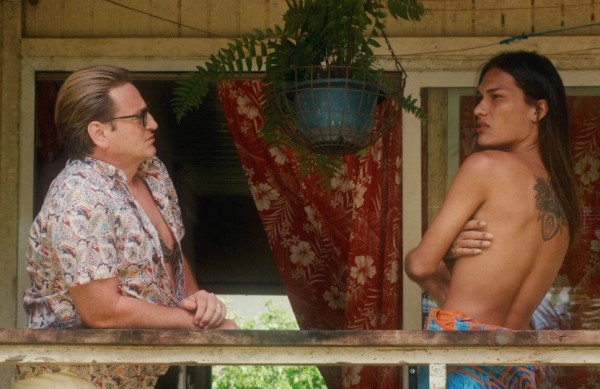
BENOÎT MAGIMEL, PAHOA MAHAGAFANAU IN PACIFICTIONA
Last edited by Chris Knipp; 07-06-2023 at 12:00 AM.
-
MASTER GARDENER (Paul Schrader 2022)
PAUL SCHRADER: THE MASTER GARDENER (2022)
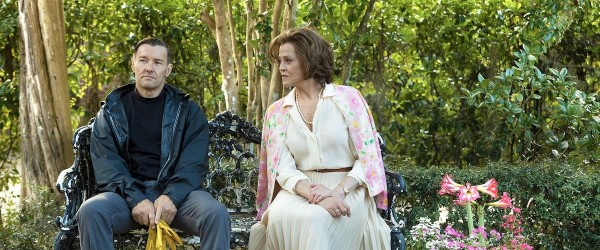
JOEL EGERTON AND SIGOURNEY WEAVER
Familiar ground
There's a certain danger for reviewers to write about this film as part of a trilogy and not look at it too closely for itself. It's certainly a must for fans of the writer-director who've seen the much admired First Reformed and the less so Card Counter. (For the record I admired the second just as much as the first, and enjoyed it considerably more.) They're all about tormented and "lonely" men who are looking for expiation and revenge for a burdensome past, Ethan Hawke's Toller in an old church, Oscar Isaac's Tillich in a succession of gambling casinos, now Joel Egerton's Narvel Roth as chief horticulturalist of the ancestral garden of a southern mansion. All three actors give terrific performances. Egerton is so tightly wound you tense up watching him.
Norvel, as cunningly crafted by Egerton, is great as a singular object. But the last prong of the trilogy doesn't work as well as either of its two predecessors. One trouble is that by now there is more to the trilogy than there is to this film. This despite Sigourney Weaver's being terrifyingly off-putting as Roth's boss lady-mistress, Miss Haverhill (or Norma), and Quintessa Swindell being beguiling as Maya, the young biracial woman, Norma's grandniece brought in as a gardening trainee by Norma's command and soon very close to Norvel. Queen, knave, pawn? These seem like chess pieces, the grand colonial mansion and its grounds like the board, the action magnificently assured but artificial, the finale murky, like much of the photography of the dp for the whole trilogy,Alexander Dynan. Why must the scenes, except for some tacked-on shots of flowers in bloom, be so dark? And while we're at it, why must each protagonist in the trilogy wind up seated at a desk tormentedly writing into a journal every single night? Does Schrader get to be as mannered and repetitious as Bresson? There's a risk of self-parody here. I understand there was laughter when the first tormented-journal-writing shot came on screen at the New York Film Festival.
There's still plenty of excitement in Master Gardener. Norvel seems about to explode, Norma is haughty and sexy, and we begin to see what's going on when Norvel takes his shirt off and reveals a perfectly sculpted torso covered over with beautifully executed fascist tattoos. Yes, he's a recovering racist (and we actually dip into a 12-step meeting) - though I, at least, never quite got what his special relation with his parole officer was or what he actually has done. Instead, we get constantly lectured in voiceover by Norvel about the history of gardening, which is boring and repetitious and feels like filler. Whatever Schrader's relation to horticulture (or not) he makes it seem a tacked-on element here, whether Norvel is teaching his pupils to snort loam to get the ancestral feel of soil or brandishing stem-clippers menacingly at poor white southern baddies. But there is tension, every time Norvel climbs up on Norma's palatial porch and pets her family pooch, or sits down for lunch with Maya. Eventually there will be the obligatory violence, and also retaliation, redemption, and love. But though Egerton is utterly convincing as a fierce repressed personality the writing doesn't work out Norvel's sin and salvation with enough diligence and at the end there wasn't, for me, enough emotion, or enough that felt real going on.
Master Gardener, 111 mins., debuted at Venice Sept. 3, 2022 and showed next month in the Main Slate at the NYFF, featuring also in two dozen other international festivals. Limited US theatrical release began May 19, 2023. Metacritic rating: 63%
-
SCARLET/L'ENVOL (Pietro Marcello 2022)
PIETRO MARCELLO: SCARLET/L'ENVOL (2022)
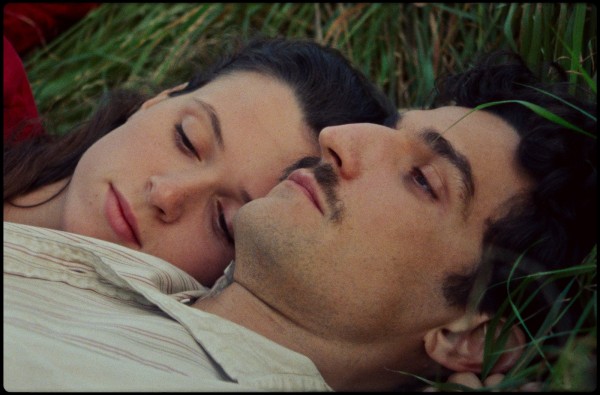
JULIETTE JOUAN, LOUIS GARREL IN SCARLET
Prince charming falls from the sky
TRAILER
The respected, eccentric Italian documentarian Pietro Marcello garnered further fame and admiration through his large-scale 2019 Italian language adaptation of the Jack London novel Martin Eden. Now for a second feature, set a little later in the early twentieth century right after World War I, he switches to the French language, and a smaller canvas. L'envol ("flying away"), is freely adapted from Scarlet Sails, a 1923 Russian novel by Alexander Grin. Described as a fairy tale for adults and children alike, it is two stories, both earthy and fanciful: the coming of age tale of Juliette (Juliette Jouan, in a striking debut, with four younger actresses), a girl of peasant origins who rises to higher things and finds a romantic boyfriend who literally falls from the sky; and the travails of Raphaël, her soulful, earthbound dad, who "works with wood," but never gets his due as a fine craftsman.
The new movie is thick with Marcello's documentary atmosphere, hybrid use of new 16mm footage and (ever more skillfully) blended-in archival film background, and elaborated with some musical numbers à la Jacques Demy with songs by the Lebanese-French composer Gabriel Yared. A lot to chew on, at times a bit much but sometimes impressively original and rich in texture - if not enough to hide the conventional storyline and some corny romantic moments, or the fact that despite vivid surfaces, there are lacunae in the narrative. Flaws aside, you don't normally get anything this rich and unique at the cineplex, and if you can see it in a theater, you my all means should.
The opening half hour is dominated by two well-weathered and salty adults. First is Raphaël (Raphaël Thiéry, the ogreish father in Giradudie's Staying Vertical) who looks like John C. Reilly only squatter and uglier and with a limp that's sometimes more of a jaunty hobble. He wanders into the village, apparently left over from the Great War, and meets Madame Adeline (actress-director Noémie Lvovsky, in earth-mother mode and having a grand time). She is the landlady of his former house, living in it now and caring for a little girl she tells him is his daughter, all that's left him since his wife, it appears, is dead.
Why and how that happened and whether the child is really legitimate, since the gone wife was violated by someone in town, are things to be hashed over in those opening segments when the the only music is Raphaël's plaintive but vigorous little accordion. A lot of this may not matter so much later - sometimes Marcello seems to lose sight of the big picture - but it's all thoroughly absorbing while it's going on. We're in that mix of authenticity and high camp of Claude Barri's 1980's Pagnol remakes, with Marcello's own documentary edge added and Marco Graziaplena's closeup-intense and lushly colorful 16mm cinematography heightening Thiéry's and Lvovsky's compelling if slightly hammy performances.
There's a fairytale element throughout in addition to the down-to-earth tone, traced through magic along with the film's feel-good storyline. Madame Adeline practices necromancy and "seeing" and draws little Juliette into it. This strain sounds a deeper note in the white-haired worker of spells (known as "La magicienne") who dwells in the forest and river, played by French cinema's no. 1 earth mother, Yolande Moreau, who as it happens played Noémie Lvovsky's mother in Lvovsky's own Camille Rewinds a decade ago. Contrast these kinds of women's rural spell-weaving with the practical magic Raphaël can simply work with his hands, repairing and tuning an old piano and making finely crafted dolls he sells in the city, when his carpentry skills aren't appreciated locally. But whether or not the spells work, Raphaël is doomed to have a hard time. Eventually as the years go by the dolls go out of style, replaced by metal and electrical toys. What happens to Juliette is harder to pinpoint and her character, though cherished, is less fully developed. She flourishes, sings, plays the piano, swims, and is happy, although she is scorned as a "witch", not entirely explicably, by the villagers.
These problems remain - Juliette's low reputation, Raphaël's struggle to earn a livelihood - but the focus shifts in the second half to romance. Juliette's prince charming appears in the dashing, handsome form of Jean (a mustachioed Louis Garrel, charming as always), a young "adventurer" who comes out of the sky when his one-engine prop plane is brought down by a carburetor problem. He says in his defense that he is not an adventurer but works, using his plane. But what he actually does is never explained.
Jean and Juliette first meet in a studied romantic set piece while both are bathing alone in the river, with her singing. She takes the lead and kisses him. He is smitten. He learns in the village later how they mock and exclude her and her family. Why she has this reputation is as unclear as what has become of her earlier intellectual promise, except that when Raphaël gives her a choice as a young girl whether or not to go away for a better education she decides to stay.
Much later Raphaël, still desperate for work after all these years, is awarded the challenging job of making the figurehead for a boat, painstakingly hand-carving it out of a large block of wood. It's admittedly an archaic ornament, a last sad hope of proving to the village wood craftsmen, as he's tried to for years, that he's gifted at "working with wood" and worthy of employment. But he is at the end of his tether and his physical strength and this turns out to be too much for him.
Though Juliette is first to kiss Jean, she drives him away - and then regrets it. All this haas something to do with red sails that appear beyond the forests, and magic, or hexes, that will bring Jean back to Juliette in a downed plane, and Madame Adeline's muscular spells get Jean's smashed legs working quickly again, after his second, rougher descent from the sky. Jean and Juliette are united now. Marcello's film remains true to its earthy fairytale style.
This may float your boat, or it may not. I was all in early on, absorbed by Thiéry and Lvovsky's gnarly vividness and the hybrid recreations of period. Later the narrative was marred somewhat by what reviewer (in Playlist) called a "muddled pace." In the love of vivid moments, narrative links are forgotten. But Marcello has produced another wholly sui generis film, which at its best moments is headily atmospheric and a delight to the eye and ear and Garrel and newcomer Jouan make a lovely couple.
Scarlet/L'envol,, 100 mins., debuted in Cannes Directors' Fortnight May 18, 2022. Also Rome, Vienna, Seville, Stockholm and other festivals, Metacritic rating: 74%.AlloCiné press rating 3.2 (64%). US theatrical release by Kino Lorber beginning June 9, 2023. Now playing in New York (IFC Center) and in Los Angeles from Jun. 23, 2023. Coming to the Bay Area July 7.
Last edited by Chris Knipp; 07-06-2023 at 09:53 AM.
 Posting Permissions
Posting Permissions
- You may not post new threads
- You may not post replies
- You may not post attachments
- You may not edit your posts
-
Forum Rules





 Reply With Quote
Reply With Quote







Bookmarks